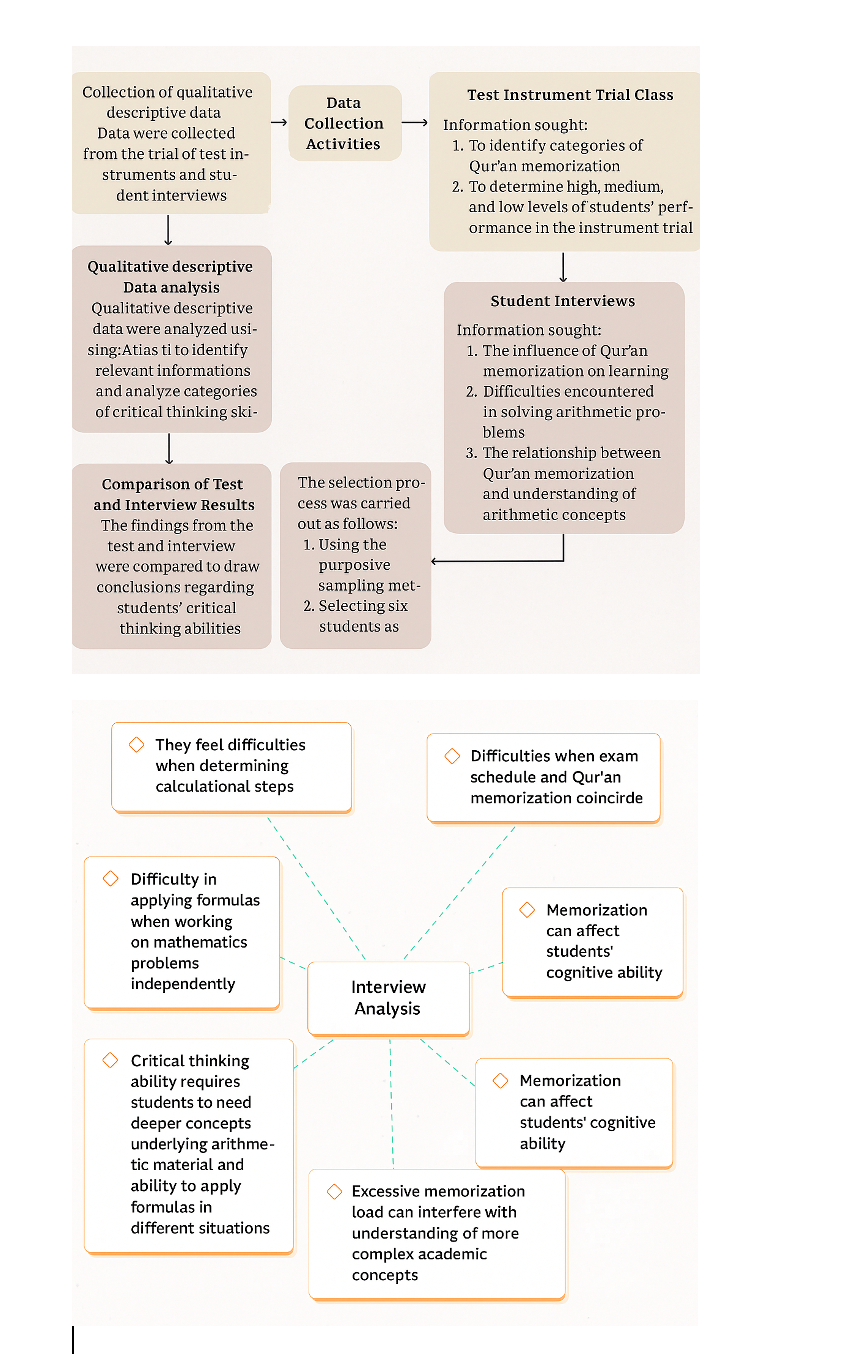Critical Thinking in Arithmetic: Insights from Qur’an-Memorizing Students
https://doi.org/10.51574/kognitif.v5i4.2341
Keywords:
Qur’an-memorizing Students , Critical Thinking, Arithmetic, Higher-Order Thinking SkillsAbstract
This study aims to examine the categories of Qur’an-memorizing students in relation to their critical thinking ability when solving Higher-Order Thinking Skills (HOTS) problems, particularly in arithmetic. The significance of this research lies in understanding the relationship between Qur’an memorization—an activity that strengthens memory capacity—and students’ critical thinking skills, which are essential for solving complex mathematical problems. This study explores whether Qur’an memorization can support the development of higher-order skills such as analysis and evaluation, which are crucial in mathematics learning. A descriptive qualitative approach was employed using HOTS test items and semi-structured interviews as instruments for data collection. Thematic analysis was applied to identify possible relationships among students’ critical thinking ability, arithmetic problem-solving performance, and Qur’an memorization practices. The findings revealed that students in the high Qur’an memorization category exhibited less consistent performance in solving HOTS problems compared to those in the moderate and low categories. This suggests that while Qur’an memorization may enhance certain aspects of critical thinking, it does not necessarily guarantee proficiency in solving higher-order mathematical problems. The study provides new insights into how faith-based learning practices may influence students’ cognitive development in mathematics and contribute to a broader understanding of the interaction between religious education and higher-order cognitive skills.
Downloads
References
Fuchs, L., Fuchs, D., Seethaler, P. M., & Barnes, M. A. (2020). Addressing the role of working memory in mathematical word-problem solving when designing intervention for struggling learners. ZDM - Mathematics Education, 52(1), 87–96. https://doi.org/10.1007/s11858-019-01070-8
Hord, C., Tzur, R., Xin, Y. P., Si, L., Kenney, R. H., & Woodward, J. (2016). Overcoming a 4th grader’s challenges with working-memory via constructivist-based pedagogy and strategic scaffolds: Tia’s solutions to challenging multiplicative tasks. Journal of Mathematical Behavior, 44, 13–33. https://doi.org/10.1016/j.jmathb.2016.09.002
Lee, K., Ng, S. F., & Bull, R. (2018). Learning and solving algebra word problems: The roles of relational skills, arithmetic, and executive functioning. Developmental Psychology, 54(9).
Manasikana, M. A., & Junaedi, I. (2021). ujmes3,+7_Manasikana+38-45. UJMES, 06(02), 38–45.
Mayang Sari, A., Susanti, N., Rahayu Program studi Matematika, C., Matematiaka, J., & Muhammadiyah Pagaralam, S. (2018). Analisis kesalahan siswa dalam menyelesaikan soal cerita materi aritmatika sosial kelas VII. Jurnal Penelitian Pendidikan Dan Pengajaran Matematika, 4(2), 61–68.
Nafiati, D. A. (2021). Revisi taksonomi Bloom: Kognitif, afektif, dan psikomotorik. Humanika, 21(2), 151–172. https://doi.org/10.21831/hum.v21i2.29252
Najiyah, S. S., & Mahmudah, W. (2025). Analisis Kemampuan Berpikir Kritis Siswa dalam Menyelesaikan Soal Cerita SPLDV Ditinjau dari Gaya Berpikir. Kognitif: Jurnal Riset HOTS Pendidikan Matematika, 5(1). https://doi.org/10.51574/kognitif.v5i1.2866
Nawaz, N., & Jahangir, Prof. Dr. S. F. (2015). Effects of Memorizing Quran by Heart (Hifz) On Later Academic Achievement. Journal of Islamic Studies and Culture, 3(1). https://doi.org/10.15640/jisc.v3n1a8
Nurcahyandi, Z. R., Ulya, H., & Wanabuliandari, S. (2024). Implementasi Model Problem Based Learning Berbantuan Media MAGE terhadap Kemampuan Berpikir Kritis Matematis Siswa. Kognitif: Jurnal Riset HOTS Pendidikan Matematika, 4(3). https://doi.org/10.51574/kognitif.v4i3.1868
Nurhayati, T., Pasaribu, N. A., Oktaviola, R., Dari, W. D., & Imamuddin, M. (2023). 188-194+juni++koloni+23. KOLONI: Jurnal Multidisiplin Ilmu, 2(2), 188–194.
Omar, N., Bin Yusof, N. H., Ismail, F. Z., & Bin Wan Abdullah, W. F. (2020). ahyan,+Journal+manager,+115+-+126+Najmiah. Tamaddun-FAI UMG, 21(1), 115–126.
Organisation for (OECD), E. C. and D. (2019). I S A. www.oecd.org/about/publishing/corrigenda.htm.
Puji Luritawaty, I., Herman, T., Prabawanto, S., Setiabudi No, J., & Barat, J. (2022). Mosharafa: Jurnal Pendidikan Matematika Analisis Cara Berpikir Kritis Mahasiswa pada Materi Bangun Ruang Sisi Datar. 11(2). http://journal.institutpendidikan.ac.id/index.php/mosharafa
Romi, Arief, Y., & Siregar, J. (2018). PERBEDAAN PRESTASI BELAJAR MATEMATIKA ANTARA SISWA YANG MENGIKUTI DAN TIDAK MENGIKUTI PROGRAM MENGHAFAL AL-QURAN (Vol. 12, Issue 1).
Scheiner, T., Godino, J. D., Montes, M. A., Pino-Fan, L. R., & Climent, N. (2022). On metaphors in thinking about preparing mathematics for teaching: In memory of José (“Pepe”) Carrillo Yáñez (1959–2021). Educational Studies in Mathematics, 253–270. https://doi.org/10.1007/s10649-022-10154-4
Sukenda Egok, A. (2016). KEMAMPUAN BERPIKIR KRITIS DAN KEMANDIRIAN BELAJAR DENGAN HASIL BELAJAR MATEMATIKA.
Tarmuji, H., Mohamed, N., Hazudin, S. F., Azmi, W., & Ahmad, W. (2023). LINKING STUDY OF MEMORIZING QURAN WITH ACADEMIC PERFORMANCE.
Umami, R., Rusdi, M., & Kamid, K. (2021). Pengembangan instrumen tes untuk mengukur higher order thinking skills (HOTS) berorientasi programme for international student asessment (PISA) pada peserta didik. JP3M (Jurnal Penelitian Pendidikan Dan Pengajaran Matematika), 7(1), 57–68. https://doi.org/10.37058/jp3m.v7i1.2069

Downloads
Published
How to Cite
Issue
Section
License
Copyright (c) 2025 Rosida Rakhmawati Muhammad, Banar Hanifah, Siti Azzahra, Siti Hanny Fahmoza, Bambang Sri Anggoro

This work is licensed under a Creative Commons Attribution-ShareAlike 4.0 International License.
Education and Talent Development Center of Indonesia (ETDC Indonesia)
e-mail: kognitif@gmail.com, website : https://etdc-indonesia.com

Kognitif: Jurnal Riset HOTS Pendidikan Matematika dengan Situs: https://etdci.org/journal/kognitif berlisensi Creative Commons Attribution-ShareAlike 4.0 International License









.png)

